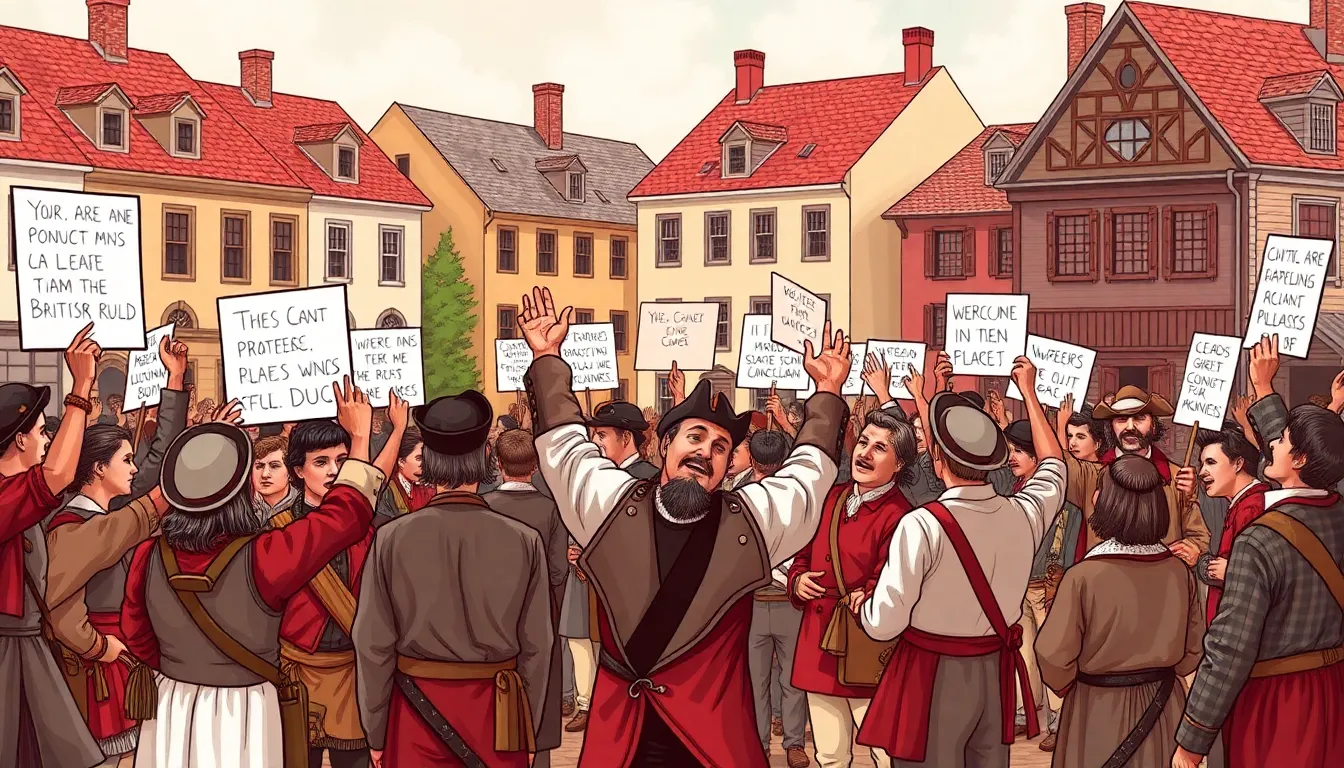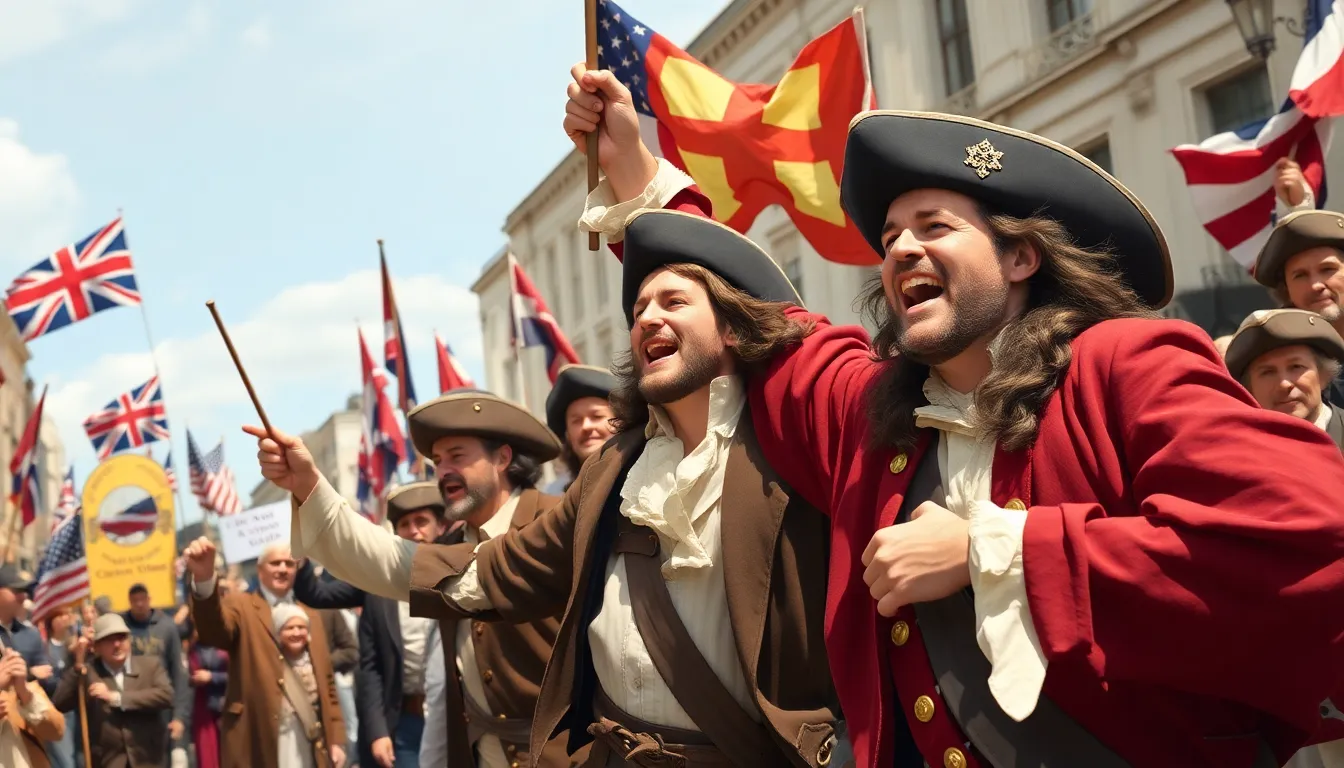In the bustling streets of colonial America, a group of rebels emerged, determined to take a stand against tyranny. The Sons of Liberty were more than just a band of troublemakers; they were the original freedom fighters, wielding protest signs instead of swords. If you think they were just a bunch of guys throwing tea into the harbor, think again! Their impact on the American Revolution was monumental, sparking a movement that would change the course of history.
Table of Contents
ToggleSons Of Liberty APUSH Definition
The Sons of Liberty served as a crucial organization in the context of the American Revolution. Formed in 1765, it arose in response to the Stamp Act, which imposed direct taxes on the colonies. Members included prominent figures such as Samuel Adams and John Hancock, who sought to protect colonial rights.
This group employed various methods to voice their dissent. They organized protests, boycotts, and public demonstrations. Notably, the Boston Tea Party exemplified their tactics, showcasing their commitment to resisting British rule. By engaging in acts of civil disobedience, they aimed to galvanize colonial sentiment against oppressive legislation.
The organization also spread information through pamphlets and articles. Communication played a vital role in their efforts, helping to unify colonists and foster a revolutionary spirit. Their activities contributed significantly to the growing sense of American identity and resistance.
Additionally, the Sons of Liberty operated across various colonies. Local chapters emerged in cities such as New York, Boston, and Philadelphia, allowing for coordinated actions against British authorities. These efforts laid the groundwork for broader revolutionary movements that followed.
Ultimately, the Sons of Liberty represented a shift in colonial attitudes toward governance. They transitioned from passive subjects to active participants in the fight for rights and freedoms. Their legacy continues to resonate in discussions of civil disobedience and advocacy for personal liberties.
Historical Context

The Sons of Liberty played a crucial role in shaping the political landscape of America during the pre-revolutionary era. Their actions symbolized the growing unrest among colonists against British rule.
Pre-Revolutionary America
Colonial life in the mid-18th century faced increased tension due to British policies. The Stamp Act of 1765 marked a significant turning point, imposing taxes on printed materials. Outraged colonists viewed these taxes as unjust, feeling their rights as Englishmen were under attack. As dissatisfaction grew, groups like the Sons of Liberty emerged to challenge British authority. Formed primarily in urban areas, this organization represented diverse colonial interests united by a common goal of resisting oppression.
Colonial Resistance
Colonial resistance took various forms throughout the period leading up to the American Revolution. Boycotts became widespread, significantly impacting British merchants. The Sons of Liberty initiated protests, raising public awareness about the injustices faced by colonists. Events like the Boston Tea Party exemplified spirited dissent, galvanizing the movement for independence. Through pamphlets and speeches, they spread revolutionary ideas and mobilized support among their peers. Their coordinated efforts across cities enabled a unified front, transforming individual grievances into collective action against British policies.
Key Figures
Key figures of the Sons of Liberty played pivotal roles in galvanizing resistance against British rule. Their leadership significantly influenced the course of the American Revolution.
Samuel Adams
Samuel Adams emerged as a prominent leader among the Sons of Liberty. He skillfully organized protests and mobilized public sentiment against oppressive British policies. Known for his persuasive writing, Adams contributed to pamphlets that stirred revolutionary ideas across the colonies. His talent for rallying people enhanced unity among the colonists. In 1765, he helped establish the Boston chapter of the Sons, serving as a crucial hub in the struggle for independence. Adams’ relentless efforts in boycotting British goods effectively strained colonial relationships with British merchants.
John Hancock
John Hancock also held a significant position within the Sons of Liberty. His wealth and social standing enabled him to support revolutionary activities financially. Hancock’s signature became iconic during the signing of the Declaration of Independence, symbolizing bold resistance. He played an essential role in organizing the Boston Tea Party, a direct action against British taxation. His leadership solidified his status as a revolutionary icon. Hancock’s ability to connect with various societal groups further strengthened the efforts of the Sons of Liberty. Through his commitment and charisma, he inspired others to join the fight for freedom.
Activities and Tactics
The Sons of Liberty employed various activities and tactics to resist British control and rally support for colonial rights. Their efforts in civil disobedience significantly shaped the revolutionary movement.
Protest Methods
Protests often centered on public demonstrations that drew large crowds. Crowds engaged in the destruction of British property, notably during events like the Boston Tea Party in December 1773. Meetings and speeches organized by members galvanized public sentiment against oppressive laws. Boycotts of British goods played a vital role in uniting colonists, as merchants faced economic pressure. Pamphlets circulated through the colonies, conveying revolutionary ideas and further igniting dissent against British rule.
Impact on British Policies
These actions compelled British authorities to reconsider their policies. The widespread boycotts led to significant declines in British trade, prompting merchants in Britain to advocate for reforms. Reports of violence and unrest from colonial protests increased pressure on Crown officials. In response, Britain repealed several unpopular laws, including the Stamp Act in 1766. These tactics underscored the effectiveness of collective action, reinforcing the resolve of the growing independence movement.
Legacy and Importance
The legacy of the Sons of Liberty continues to resonate in discussions about civil rights and resistance against oppression. Their united front established a framework for future social movements, emphasizing the power of collective action in pursuing justice. By disrupting British trade and fundamentally altering relationships with Britain, the Sons of Liberty created significant economic repercussions, leading to the repeal of the Stamp Act in 1766.
Their tactics of protest and civil disobedience inspired generations. Leaders like Samuel Adams and John Hancock became symbols of resistance, galvanizing support for independence. Notably, Hancock’s financial backing of revolutionary initiatives showcased how individuals can influence large-scale movements through contributions and leadership.
Local chapters in cities such as New York, Boston, and Philadelphia built networks fostering collaboration among colonists. Each city’s unique challenges prompted tailored strategies, yet a shared commitment to freedom united their efforts. Such localized action ensured widespread participation and highlighted varying colonial experiences while addressing common grievances against British rule.
Pamphlets circulated by the group effectively ignited revolutionary sentiment among colonists. These writings provided accessible information, bridging gaps in awareness surrounding injustices imposed by British policies. Knowledge dissemination played a vital role in shaping public opinion and fostering solidarity.
In summation, the Sons of Liberty marked a turning point in American history. Their persistent advocacy for colonial rights laid a foundation for the American Revolution and subsequent debates around civil liberties. The movement’s emphasis on active resistance and advocacy set a precedent for future generations seeking social change in America and beyond.
The Sons of Liberty played an indispensable role in shaping America’s path to independence. Their commitment to civil disobedience and collective action laid the groundwork for future social movements. By uniting diverse colonial interests against British oppression, they transformed individual grievances into a powerful revolutionary force.
The legacy of the Sons of Liberty extends beyond their time, inspiring generations to advocate for personal liberties and social justice. Their innovative tactics and effective communication strategies not only influenced the American Revolution but also set a precedent for resistance against tyranny. As champions of freedom, the Sons of Liberty remain a pivotal symbol in the ongoing quest for justice and equality.




